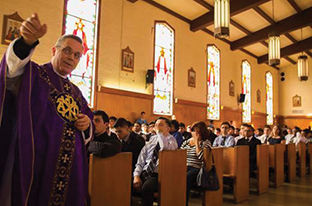Each year since 1974, the National Catholic Education Association (NCEA) has provided a theme or motto for National Catholic Schools Week. I have a few favorites: 1995 and 1996, “Catholic Schools: Schools You Can Believe In,” and 2002, “Catholic Schools: Where Faith & Knowledge Meet.”
I have to admit that “A Catholic Education is An Advantage for Life” is not one of my favorites. After 19 years in Catholic high school education (12 as a principal and seven as a superintendent), I have never used this phrase once. When I became a principal in 1996 I found in my desk an oversize rubber stamp with this saying on it. I never used it.
It is not that I do not believe in the truth behind the saying. There is plenty of data that proves that “A Catholic Education is An Advantage for Life.”
Higher college acceptance and attendance rates, higher SAT and PSAT scores both nationally and in California, the higher earning power that comes with the college degree, etc.
I guess I have avoided this phrase because, with American ears, the phrase implies a certain economic or utilitarian “bottom line.” And I know in my heart and in my experience that a good Catholic education is and means a lot more than that.
While this phrase assumes the mission of Catholic education, it does not make you think about the mission. And what is that mission:
>To educate the mind, body and souls of young people
>To form them into loving disciples and witnesses of Jesus Christ
>To teach them how to grow in sanctity and become saints
>With this formation they become leaders in the Church and society.
rnHow is this accomplished?
This is accomplished in so many ways. Yes, good academics. Yes, good discipline. Yes, good athletics. Yes, a safe, clean and beautiful learning environment. Yes, good teacher accountability. Yes, parent involvement. Yes, accreditation.
But one of the “secrets” of Catholic education is that most of our schools provide a loving, caring community of faith where students and teachers can grow in wholeness and holiness. Faith can be shared and learned in a Catholic school.
When young people feel they are cared for, loved, let alone noticed, they will thrive both academically, socially and spiritually.
This loving, caring Catholic educational community is a place for growth not only for students but for the faculty and staff as well.
The essential themes of Catholic spirituality include conversion, repentance and turning toward the Lord.
This conversion is ongoing throughout our lives. It does not end with confirmation or accreditation. If we are to be authentically Catholic we must see growth as a lifelong process — growth of mind, body and soul. We cannot rest on our laurels. We can always be better academically, socially and spiritually.
A big part of this authenticity is the witness of school leadership and teachers. Our schools are blessed with many non-Catholic teachers who live the mission of Catholic schools.
Our school presidents, principals, vice principals, campus ministers and religion teachers must be “practicing Catholics.” All Catholics on the faculty must do their best to be “practicing Catholics.”
A Catholic school teacher or principal who speaks out against the teaching of Christ as taught by the Church is not being authentic to his or her calling as a Catholic educator. When this happens there is a lack of integrity, a dysfunction.
Conversion, a deeper spirituality and growth in the faith do not happen overnight for students or adults. The journey can be a long one or it may be short.
But the enthusiasm of our school leadership and teachers will help them along the journey toward our Lord who is “the Way, the Truth and the Light.”
Yes, “A Catholic Education is An Advantage for Life,” if life is just not referring to life in this world but to the supernatural life that God shares with us in the next world.

